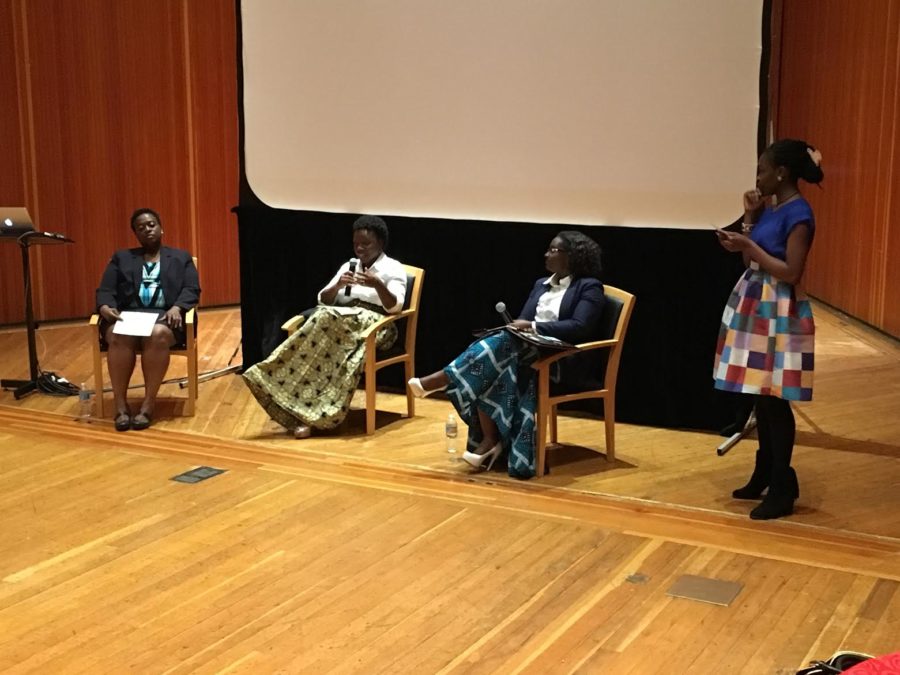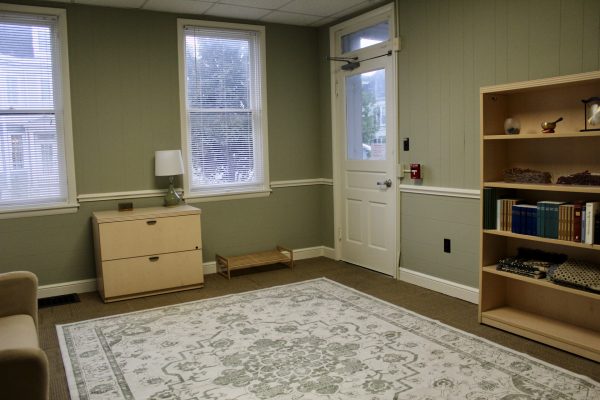“Aliens Among Us:” Panelists Speak on Immigration, Refugee Experiences
Rachael Franchini ’19/ The Dickinsonian
The three immigrant women all came from Liberia. From left to right: Minikon, Lee, Jallah, Ogunsola.
Three women came to campus on Friday, March 31 for an informal panel discussion of their experiences as immigrants and refugees from Liberia.
The panelists were Samantha Jallah, a public health attorney; Patricia Minikon, an immigration lawyer and Chenda Lee, a reverend for the United Methodist Church. They presented to a crowd of about 50 people in ATS at 6:30 p.m.
The student organizer of the event, Titilope Ogunsola ’19, introduced the women and stated that the discussion would focus on themes of refugees, immigration and wartime crises.
To start off the night, a video set to the music of “My Country, ’Tis of Thee” was shown to the audience. The film included facts, statistics and quotes about immigration, as well as highlighting several immigrant celebrities and corporations started or run by immigrants.
Ogunsola passed out index cards to the audience so they could write down comments, reactions or questions for the speakers that would be read during the question and answer section of the event.
The women kicked off the panel describing how each came to the United States. Jallah read a poem describing the anxiety and confusion of her experience, which garnered tears from Lee, and set the tone for the evening.
“Those memories [of instability in Liberia] have been suppressed,” Lee said in reaction to Jallah’s poem. “[I] haven’t had to or wanted to
think of them, it’s a part of my life I want to forget in some ways.”
Next, each speaker gave one word that described her transition to the United States and an explanation for her choice. The answers ranged from “smooth” from Minikon, who came to the U.S. as a foreign student, to “disconnect” from Lee, to “depressed” from Jallah.
Jallah emphasized the difficulty of leaving behind family pictures during her departure from Liberia at 13 years old.
“There’s a lot of things we take for granted,” she explained. “It was a big deal when we had pictures taken…few [pictures] existed, [so] leaving them behinds means so much.”
The women then launched into a discussion about stereotypes that they encountered during their transitional periods as immigrants from Liberia.
Some of the women described being asked by their American classmates and others if in Liberia they “lived in trees” or “wore clothes.”
“I was the only black person in the entire school in Vermont,” Minikon recalled. “People would always ask me ‘can you repeat yourself,’” due to her Liberian accent.
The final topic of discussion was about assimilation.
“I held onto Liberia so tightly that I wasn’t open to experience here,” Jallah shared. On what advice she would give her past self, she said, “I would say you can still be you here…Hold on, but know that there’s enough room for your heart to stretch.”
The event concluded with a question and answer session during which students and attendees asked questions on such topics as personal and professional advice to college students, career choices and how to deal with bias on a daily basis.
“Meeting these women and hearing their stories for me meant so much more because as an African-American woman of Nigerian descent, I identified with them on so many levels in terms of my background, my family…their experiences reminded me of my home community,” stated Ogunsola.
“To hear how they pushed through those situations in tough times was something encouraging to hear…” she continued, “and they pushed through it and they are still pushing through…the journey of getting people to realize that you are their equal never ends…the journey and the strive for equality never ends.”
The student groups involved in the organization of the event include the Black Student Union (BSU), We Introduce Nations at Dickinson (WIND) and the Student Liberation Movement (SLM). The event was also held in collaboration with Liberian Awards, Inc., which is a scholarship award foundation headed by Jallah, according to Ogunsola.
“What meant the world to me was seeing people from my classes, people from our Dickinson community, friends, professors, and even people from the Carlisle community…that made my evening,” concluded Ogunsola. “Not only did people come out to the event, they were engaged.”
Assistant Professor of French and Francophone Studies Linda Brindeau found the event “timely,” given the controversy surrounding President Trump’s travel ban. “As an immigrant to the US, I always cringed when people tell me that they don’t have a problem with immigration as long as it is legal, as if it was that easy,” said Brindeau, who has “had to deal with visas for 17 years,” requiring her to “take countless trips back and forth to France to make sure I was always within my visa limitation, not mentioning the financial toll…”
“Taken out of context, refugees often are just reduced to a number,” continued Brindeau. “I truly appreciate how [the three speakers] debunked the myth of ‘poor Africans being “rescued” by Western countries…’ Once they resettled, they had to start over with a much lower standard of living than the one they enjoyed in Liberia. Not surprisingly, these three women overcame obstacles and are now making a difference in the US.”
“To me,” concluded Brindeau, “they epitomize the richness of transnational migration.”




